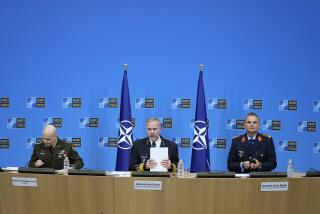Defense Chiefs Approve of NATO’s Plan : Military: Ministers from alliance’s member countries clear way for formal adoption of peacekeeping mission.
BRUSSELS — Defense ministers from NATO’s 16 member states on Wednesday approved detailed plans for sending up to 60,000 troops to enforce a Bosnian peace settlement, clearing the way for formal political approval that is likely to come Friday.
U.S. Defense Secretary William J. Perry praised the proposal, which calls for a large contingent of U.S. ground forces, as “a sound plan, carefully crafted to send a strong, able force to implement a peace agreement.”
U.S. officials said Gen. George Joulwan, the U.S. Army general who commands NATO forces, will probably brief President Clinton in Germany on Saturday on the plan before Clinton addresses German-based U.S. troops assigned to the Bosnia force.
Alliance ambassadors are scheduled to meet later today to decide when to send a vanguard of about 2,600 soldiers, including several hundred Americans, to the region to prepare for the main force.
U.S. officials indicated that the advance group will probably begin moving this weekend.
A reconnaissance team from the 1st Armored Division arrived Wednesday in Kalesija, an abandoned village in northeastern Bosnia-Herzegovina, to check landing strips, strength of roads and bridges and the location of minefields around the village.
In Paris, the French Foreign Ministry announced that heads of state from Bosnia, Croatia and Serbia will sign the Bosnian peace accord there on Dec. 14.
As the NATO ministers in Brussels focused on launching the North Atlantic Treaty Organization’s first ground mission outside alliance territory, U.S. officials concentrated on ways to ensure that the alliance implementation force, known as IFOR, will leave Bosnia on schedule after one year.
Perry said he told his NATO counterparts that a carefully controlled disarmament leading to a balance of military forces among the warring parties in Bosnia is essential to secure a durable peace.
“I believe the imbalance of arms, particularly between the Bosnian government and the Bosnia Serbs, was a significant factor four years ago in starting the war,” Perry said. “We don’t want to leave Bosnia a year from now with the same imbalance.”
With assistance from the Serb-dominated Yugoslav army, the Bosnian Serbs maintained firepower superiority throughout the conflict.
Europeans, anxious to prevent the conflict from escalating, strenuously supported an arms embargo imposed by the U.N. Security Council on the region; this has prevented the mainly Muslim Bosnian government forces from acquiring significant numbers of heavy weapons.
Threats, mainly from the U.S. Congress, to ship arms to the Bosnian government strained transatlantic relations much of this year.
Perry warned on Wednesday that the Administration is prepared to build up Bosnian government forces if the Bosnian Serbs fail to disarm, as they agreed to do as part of the peace accord reached in Dayton, Ohio. A special disarmament conference is scheduled for next month in Bonn.
“I have a high level of confidence the build-down will work, but we’ve made it known we’re willing to take any action necessary to redress the imbalance,” he told reporters.
Under the Dayton accord, the embargo against the shipment of small arms to Bosnia will be lifted after three months, with heavy weapons permitted after six months.
More to Read
Sign up for Essential California
The most important California stories and recommendations in your inbox every morning.
You may occasionally receive promotional content from the Los Angeles Times.










